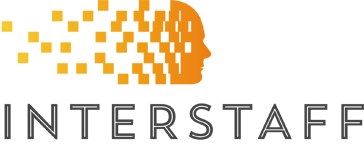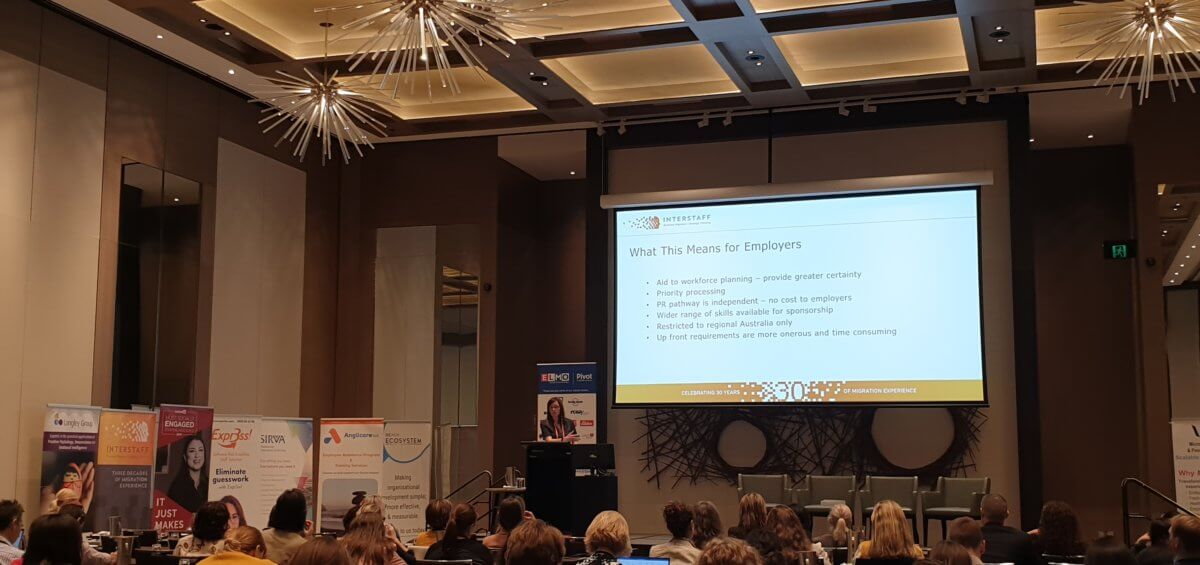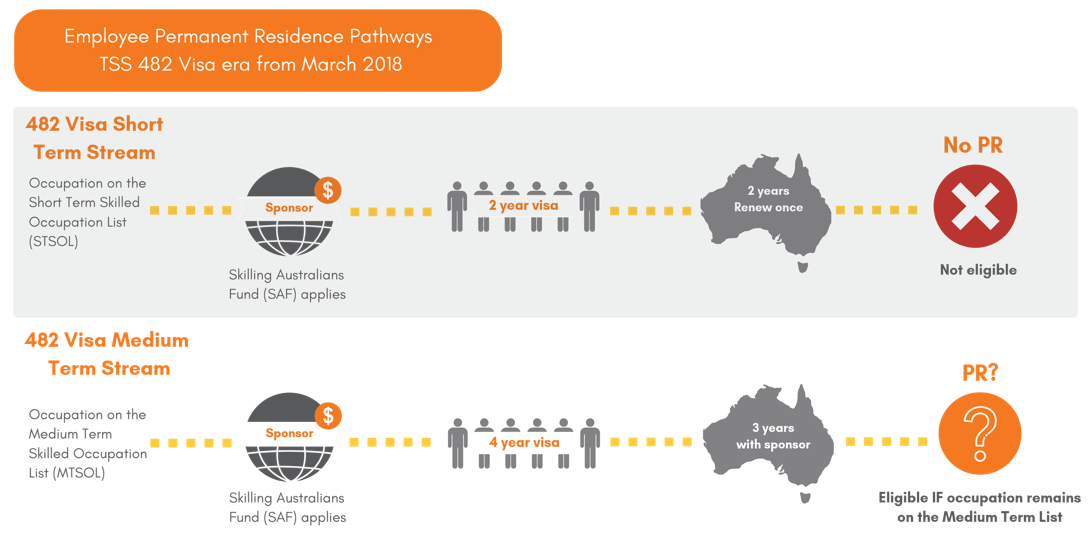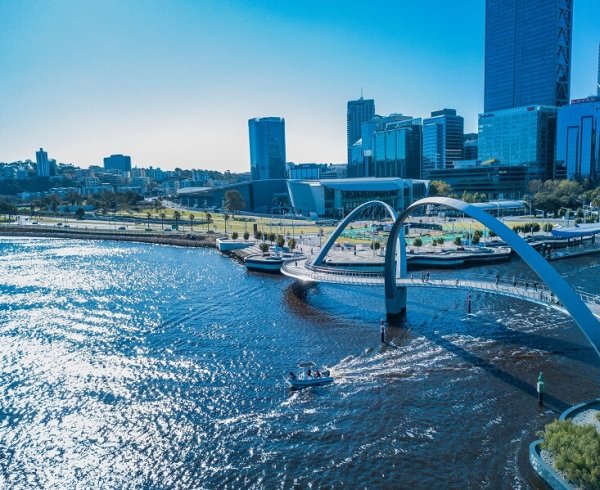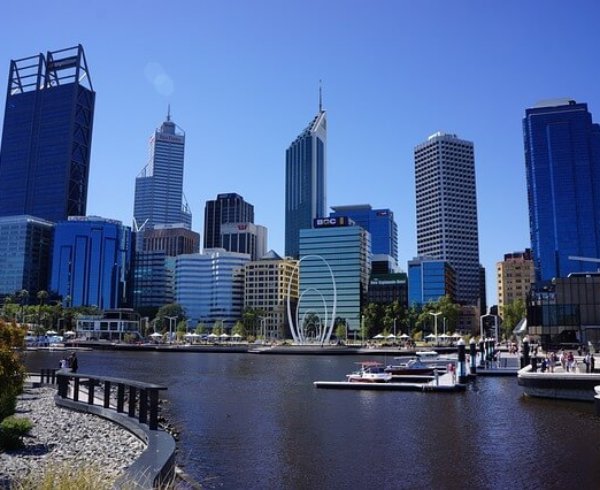Interstaff’s Managing Director, Sheila Woods recently had the pleasure of presenting at the 2019 WA HR Leadership Forum to share insights on fundamental shifts in Australia’s Skilled Migration Program. Sheila discussed how Australia’s new regional policy direction will impact businesses with operations in regional or remote areas. Here’s a summary of our presentation.
Adapting to fundamental shifts in Australia’s Skilled Migration program
Over the 30 years Interstaff has been operating, we have certainly witnessed a lot of visa changes. The migration landscape is constantly evolving and in recent years, employers have had to respond and adapt to a more complex, restrictive and costly legislative framework to sponsor overseas workers. This became particularly evident from March 2018, when the 457 Visa was replaced by the Temporary Skills Shortage (TSS) Subclass 482 Visa.
A Smaller Migration Program
This year, the Government formalised further restrictions to Australia’s migration program by reducing the permanent migration intake by 30,000 people per year. Australia’s permanent migration intake is now set at 160,000 people per year for the next four years, with 23,000 of those placements becoming available for new Regional Skilled Visas commencing in November 2019.
The revised migration planning levels reflect a policy shift towards encouraging migrants to live and work in regional areas. As part of this, there will be a new definition of ‘Regional Australia’ – with regional visas available across all of Australia except for Melbourne, Sydney and Brisbane (as at 14 November 2019).
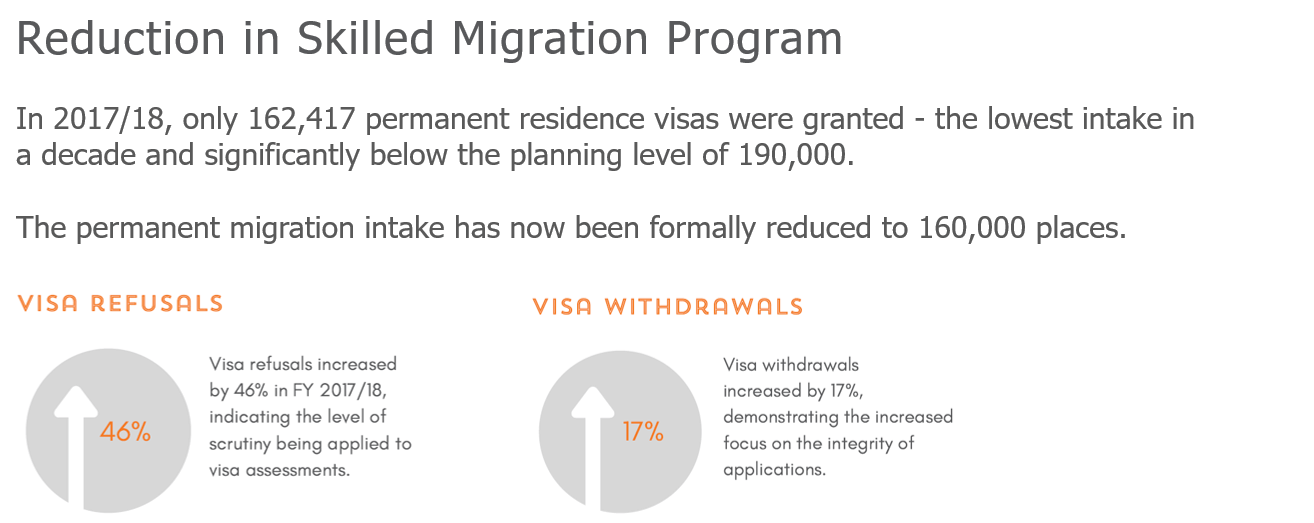
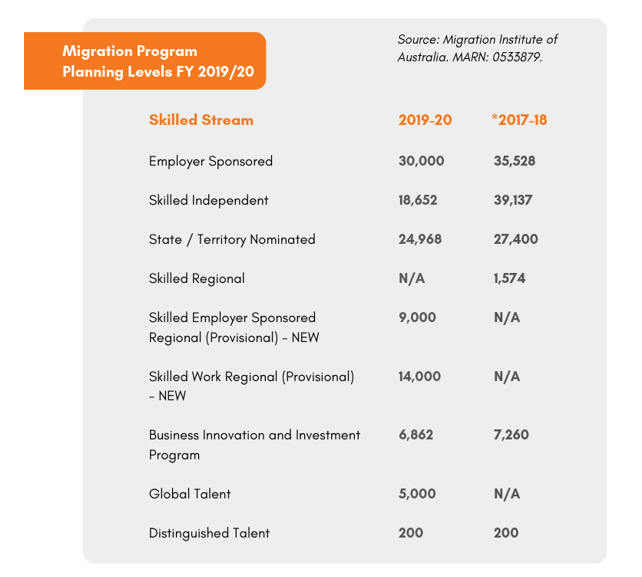
Establishing the Regional Migration Program
Pathways for skilled migrants to work in regional areas are being established in several ways. The Government has introduced Working Holiday Visa concessions enabling overseas workers to work for longer in regional areas for one employer.
Regional visa arrangements such as the Pacific Labour Scheme are also ongoing and new Designated Area Migration Agreements (DAMA’s) are being established across the country. Two new Skilled Regional Visas will also become available from 16 November 2019 – Subclasses 491 and 494 – to establish the regional migration program. The Subclass 191 Regional Skilled (Permanent Residence) Visa will become available to eligible migrants who hold a Subclass 491 or 494 Visa from November 2022.
The Subclass 491 Skilled Work Regional Provisional Visa
The new 491 Skilled Regional Visa will provide skilled migrants a points-tested option to work in regional areas for five years. It will not require employer sponsorship and provides a permanent residence pathway after three years of regional work. You can find out more about the points test and upcoming changes here.
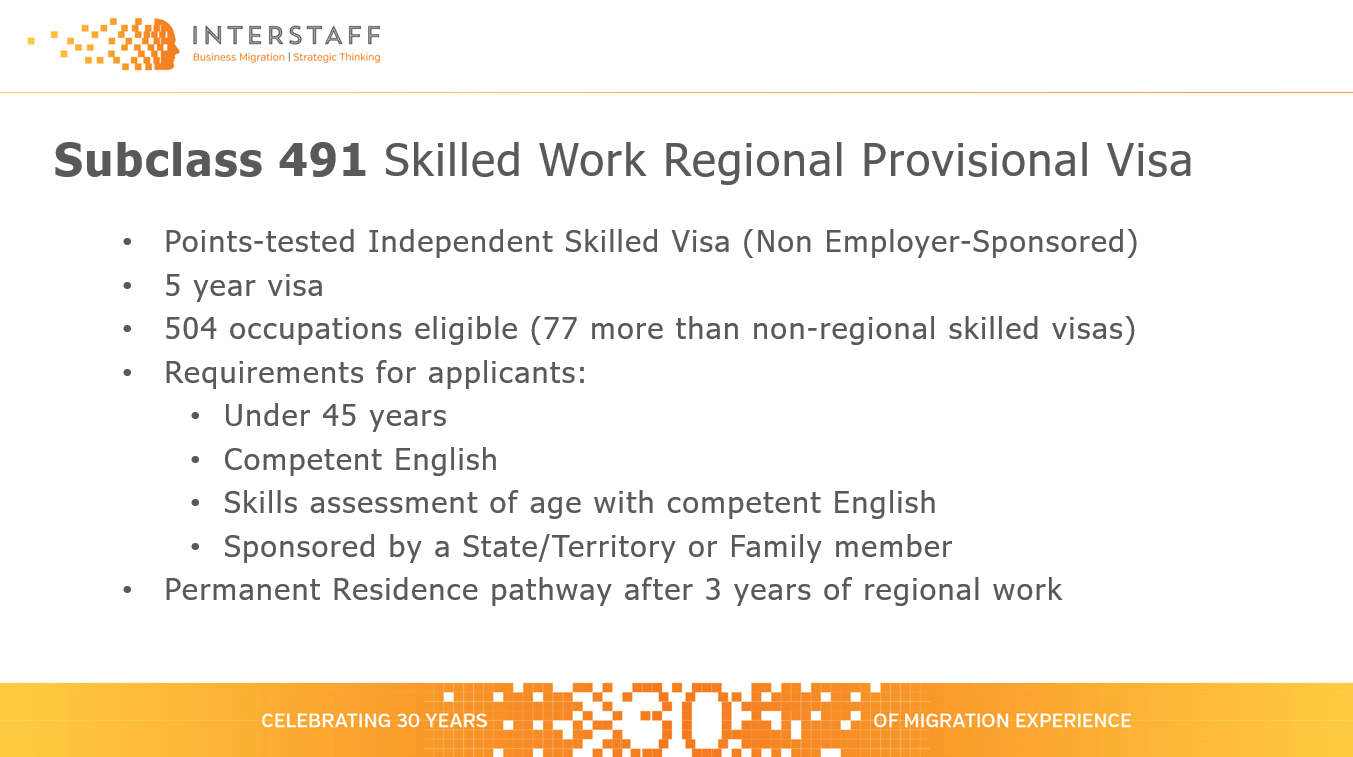
The Subclass 494 Employer Sponsored Regional Provisional Visa
Employers may be particularly interested in the new 494 Visa. It provides an employer-sponsored option to engage visa holders for work in regional or remote areas.
Compared to the TSS 482 Visa program, the new Subclass 494 Skilled Employer Sponsored Regional (SESR) Visa will enable employers to sponsor workers under a broader list of eligible occupations with priority visa processing and a pathway to permanent residence after an applicant has lived and worked regionally for three years.
However, while the 494 Visa will provide employers added flexibility, the visa process will be complex and both employers and visa applicants will need to provide substantial evidence to satisfy application requirements.
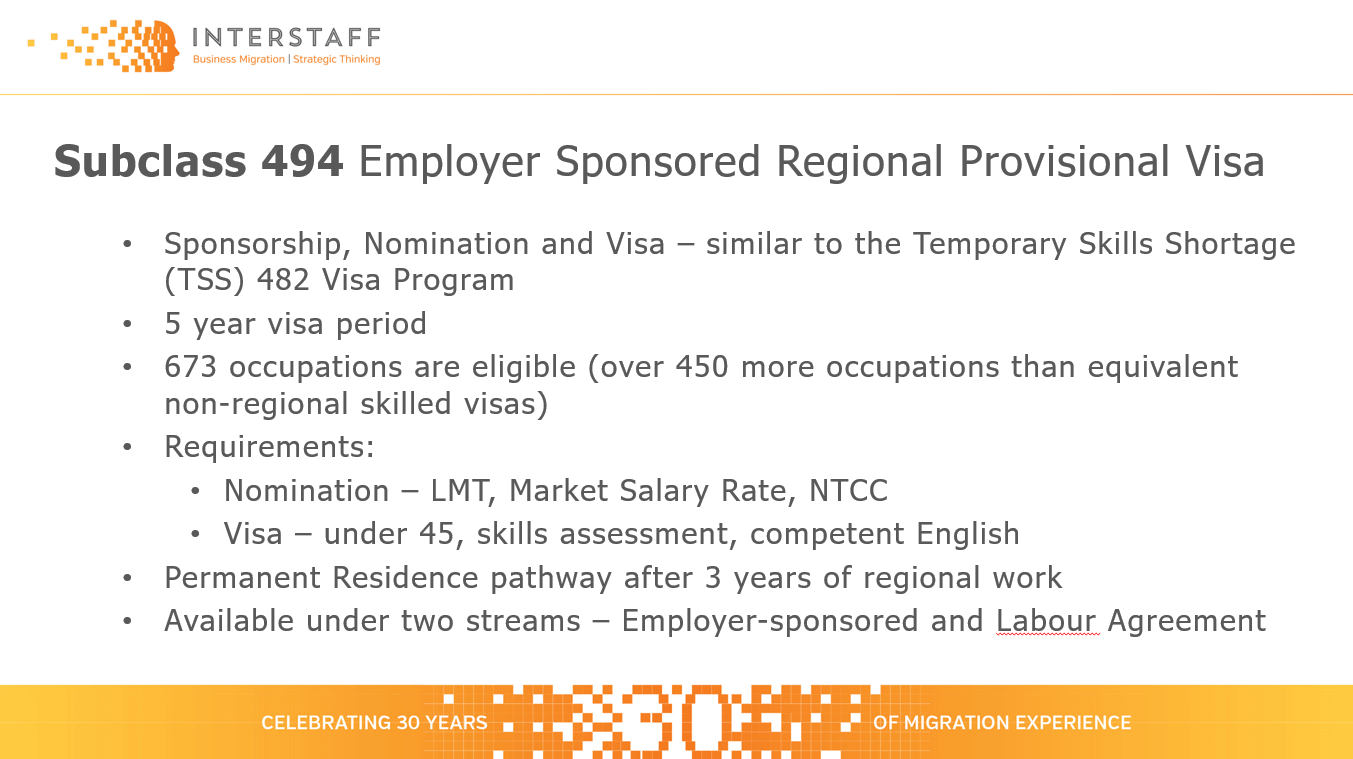
The Subclass 191 Permanent Residence Skilled Regional Visa
The new 191 Visa will become available from November 2022 as a permanent residence visa option for skilled migrants on a Subclass 491 or 494 Regional Visa who have worked in a regional area for three years.
Designated Area Migration Agreements (DAMA’s)
DAMA’s are labour arrangements between an eligible business, the Federal Government and a Designated Area Representative, such as a city/town/shire council, that allow an employer to fill labour shortages in a specified area with overseas workers.
These migration arrangements provide employers a five year period to sponsor overseas workers with agreed concessions for skill level, occupations and salary levels. It may be an option for eligible businesses with operations in a DAMA area.
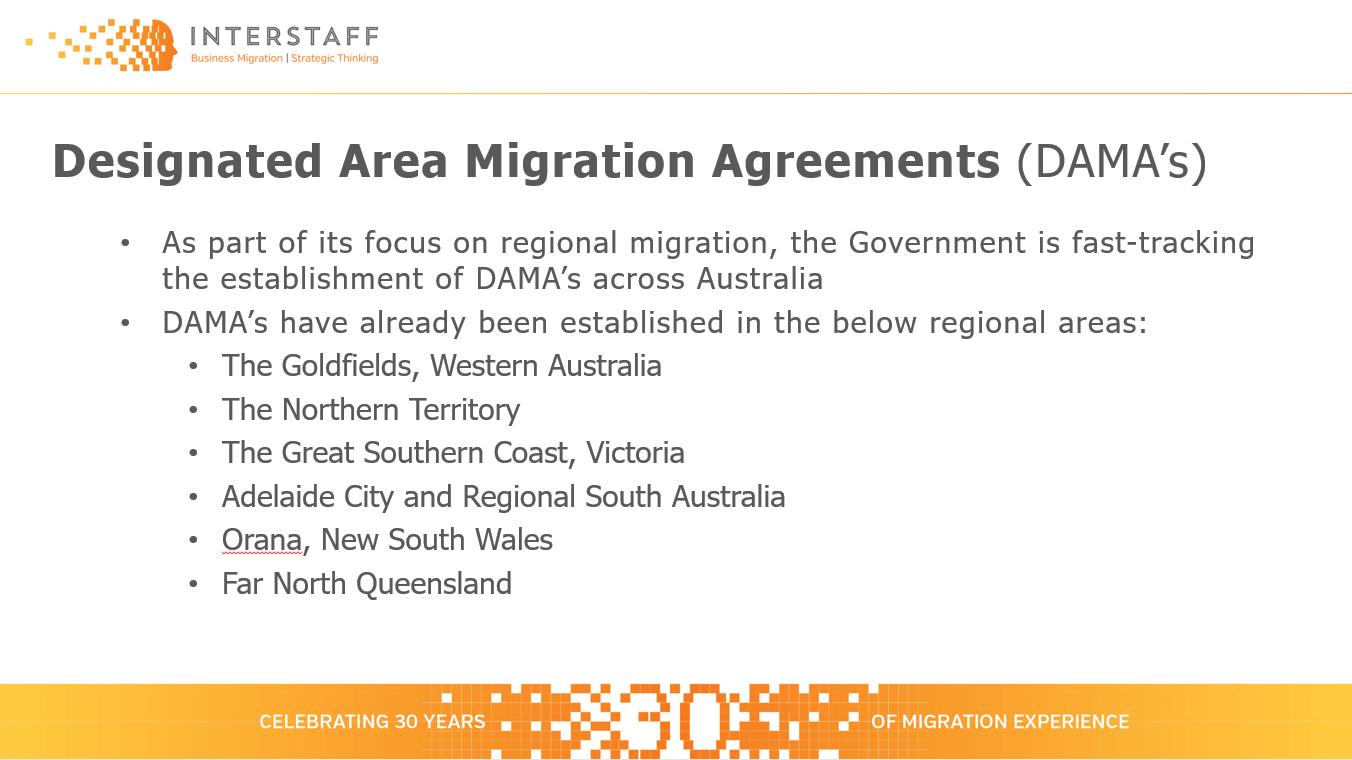
What this means for employers | Greater flexibility, but a more complex application process
The Government’s shift in focus to regional migration provides employers greater flexibility to sponsor skilled migrants in regional areas. In particular, the 494 Visa can be used as an alternative option to the Subclass 482 TSS Visa – which many employers would agree is quite restrictive compared to the previous 457 Visa program.
A wider range of skills will be available for visa sponsorship in regional areas. In some cases, the 494 Visa can also provide a pathway to permanent residence for applicants who currently have limited options to stay.
Alternative permanent residence options
If your business employs Subclass 457 or 482 Visa holders in regional areas, it could consider the 494 Visa as an alternative method of securing permanent residence where it is otherwise not available – especially for 482 Short Term Stream visa holders.
Overseas employees on a 494 Visa may be eligible for permanent residence through the 191 Visa from November 2022, whether or not their occupation remains on the list of eligible occupations for skilled migration, which is a current risk in the existing 187 and 186 Visa programs.
In our experience, a pathway to permanent residence is a great incentive for skilled migrants and can help your business attract and retain global talent for certain skills that may be difficult to source in the local market.
The introduction of the provisional 494 Visa will however require employers and visa applicants to provide substantial evidence for a valid application as it will be assessed with similar rigour as visas for permanent residence.
Visa complexity
There is a level of complexity involved in sponsoring under the new visa and employers will be required to obtain support from a regional certifying body. Skills assessments and other requirements will also need to be obtained to satisfy rigorous visa requirements.
As with the 482 Visa program, Labour Market Testing (LMT) will be required to show how employers have difficulty in finding suitable candidates locally. This has come down to a very rigid approach to assess whether or not sufficient advertising in the local market has been undertaken. The particular requirements for the 494 Visa are expected in late October.
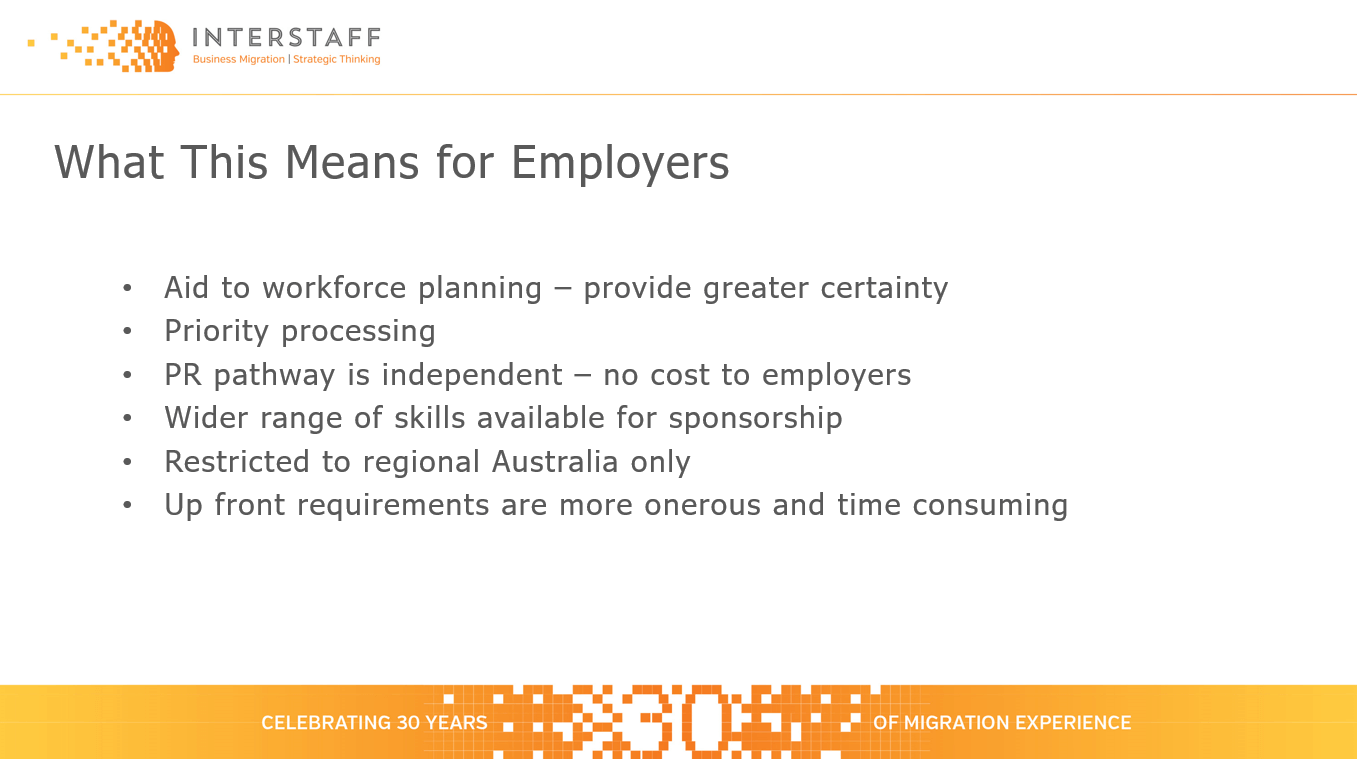
Interstaff’s insights in The Australian Mining Review and The Australian Oil and Gas Review
Find out more about the impact of the Regional Visa changes in our insights provided for an article published in The Australian Mining Review and The Australian Oil and Gas Review. In the article, Interstaff’s Managing Director, Sheila Woods commented on how the upcoming Regional Skilled Visa changes will impact businesses in the Resource Industry.
With the new Regional Skilled Visas commencing on 16 November, the article provides some timely information for businesses and we encourage you to have a read.
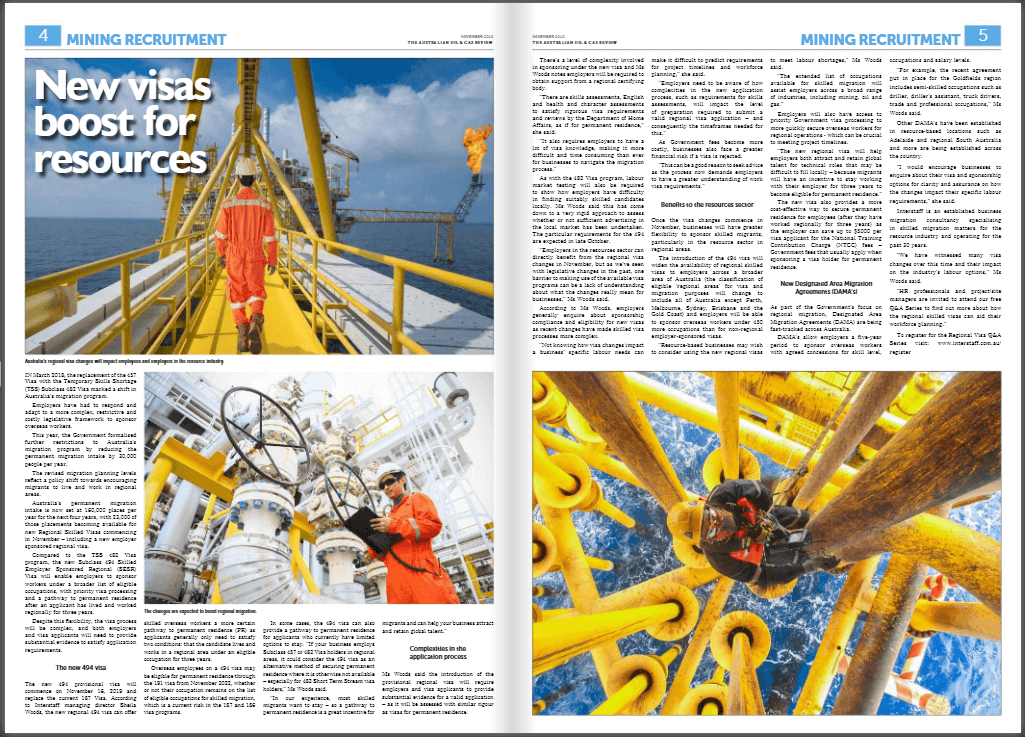
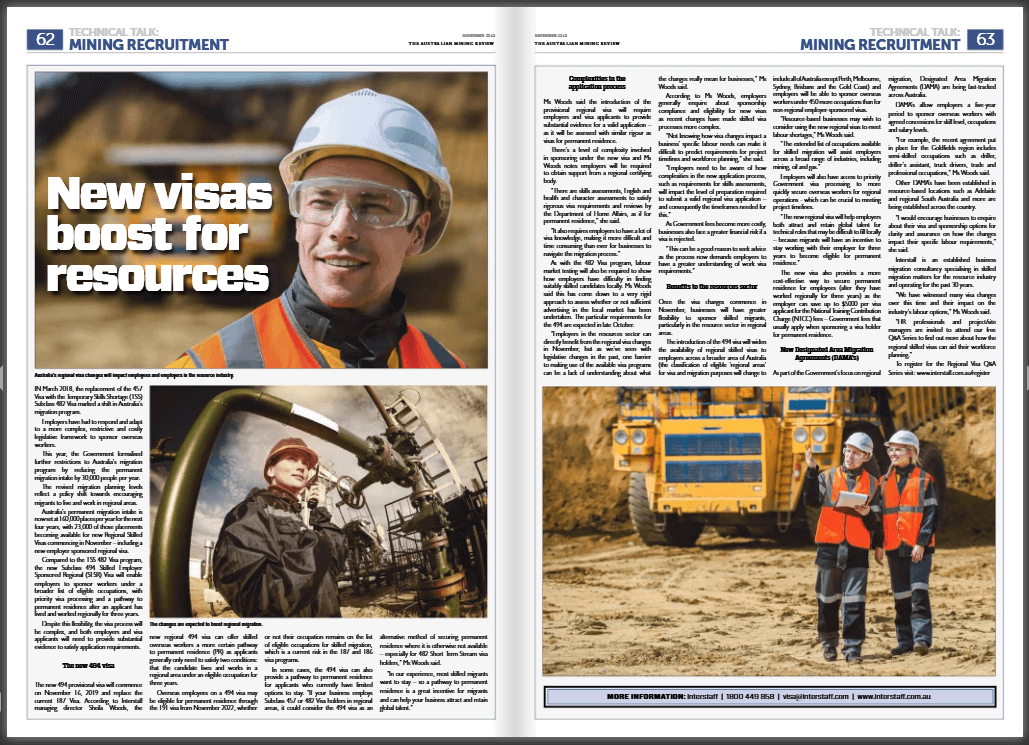
Regional Visa Q&A Series for HR Professionals and Business Owners
In an online Q&A Video Series releasing on 28 November, Interstaff will be addressing questions submitted by HR Professionals, Site/Operations Managers and Business Owners about the impact of the new Regional 494 Visa for businesses in the Resource Industry and other businesses with regional operations.
For the opportunity to take part and submit questions for the Q&A Video Series, and to access upcoming Videos and Visa Tools, register now and stay informed about how the Regional Visa changes impact your business.
Regional Visa Changes for Skilled Migrants
If you are a skilled migrant and interested in Regional Visa options, you may wish to get in touch for a visa pre-assessment from 16 November when the new Regional Visas commence.
Our team assist individuals and businesses with the visa and sponsorship process for all Australian cities and regional areas. If you have any queries, please don’t hesitate to contact our team of Registered Migration Agents on +61 8 9221 3388 (or National Free Call 1800 449 858) or [email protected]
Source:
